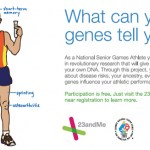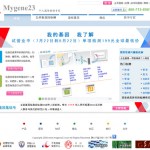personal genomics
If you have a minute, I'd appreciate it if you fill out this survey, the 6 questions should take 30 seconds (2 optional questions about where you came from to take the survey). This is for a friend's research project. The results will be posted next week.
Dan MacArthur has a very good post, New York Times adopts medical establishment line on personal genomics:
The NY Times has an article entitled "Buyer beware of home DNA tests" that adopts the paternalistic party line of the medical establishment: taking DNA tests without a doctor's advice is hazardous to your health.
Remarkably, the article acknowledges that qualified genetic counsellors are few and far between and that "most practicing physicians lack the knowledge and training in genetics to interpret [DNA tests] properly", and yet still suggests that customers should "take the findings to…
The NY Times has an article entitled "Buyer beware of home DNA tests" that adopts the paternalistic party line of the medical establishment: taking DNA tests without a doctor's advice is hazardous to your health.
Remarkably, the article acknowledges that qualified genetic counsellors are few and far between and that "most practicing physicians lack the knowledge and training in genetics to interpret [DNA tests] properly", and yet still suggests that customers should "take the findings to a qualified expert".
Begging the question: which qualified expert should customers be taking their test…
Sequencing giant Illumina has announced that it has delivered its first commercial personal genome sequence. The sequence was generated by the genome sequencing service launched by Illumina back in June, and was delivered in collaboration with new personal genomics company Pathway Genomics.
Illumina's genome sequencing service costs $48,000, and its first customer was entrepreneur Hermann Hauser. Bio-IT World summarises details of the sequencing itself:
Illumina completed the sequence at its CLIA-certified laboratory, producing more than 110 billion base calls, good for 30X coverage of the…
Dan Vorhaus has a great post in Genomics Law Report outlining recommendations made by a recent NIH-CDC workshop on the scientific foundations of personal genomics. The workshop included key stake-holders from academia, policy advisory groups and the personal genomics industry.
The recommendations from the workshop seemed on-target to me, and I was particularly pleased to see explicit recognition of the notion that consumer genomics may provide personal utility even if its clinical utility is marginal - in other words, that genetic information can still have a…
Mihaescu, R., van Hoek, M., Sijbrands, E., Uitterlinden, A., Witteman, J., Hofman, A., van Duijn, C., & Janssens, A. (2009). Evaluation of risk prediction updates from commercial genome-wide scans Genetics in Medicine, 11 (8), 588-594 DOI: 10.1097/GIM.0b013e3181b13a4f
Caroline Wright from the Public Health Genomics Foundation has a concise post describing the results from a recent paper in Genetic Medicine. The paper evaluates the probability that personal genomics customers will find that their predicted risk of a common disease changes significantly over time as their genetic data…
A tweet from personal genomics company 23andMe (see screenshot below) sparked my interest:
I knew 23andMe had been successful in recruiting Parkinsons patients as part of its targeted drive, and the 337 unspecified "patients" are the product of their broader recruitment drive for diseased genomes, Research Revolution (which I've dissected in a previous post) - but the athletes were news to me.
A little Google-trawling revealed (see page 15 of this PDF article from Palo Alto Online) that 23andMe offered free genome scans to all of the participants in the currently ongoing Palo Alto…
A reader pointed me to this press release on the dire financial state of Icelandic biotech deCODE Genetics.
The slow financial train-wreck that is deCODE has been sliding off the rails for years (see stock price chart below), but things look set to reach their final resolution one way or another within the next few months: the company currently has $3.8 million in cash reserves, but is bleeding out $12 million per quarter, and "believes it has sufficient resources to fund operations only into the latter half of the third quarter".
Where to from here? In the press release, deCODE…
CNN reports:
At the Chongqing Children's Palace, experts are hoping to revolutionize child-rearing with the help of science. About 30 children aged 3 to 12 years old and their parents are participating in a new program that uses DNA testing to identify genetic gifts and predict the future.
The test is conducted by the Shanghai Biochip Corporation. Scientists claim a simple saliva swab collects as many as 10,000 cells that enable them to isolate eleven different genes. By taking a closer look at the genetic codes, they say they can extract information about a child's IQ, emotional control,…
Those interested in the commercial, technical or ethical issues around the emerging industry of personal genomics now have a chance to put their questions to the co-founder of 23andMe, Anne Wojcicki. The NY Times blog Freakonomics is inviting readers to add their questions to the comments section of this post; Wojcicki will respond in a later post.
The questions are already pouring in: one reader asks if Wojcicki believes that there is a genetic component to intelligence; another asks for advice on getting a tattoo made from his 23andMe raw data; another reader is looking for a job.
This is…
Personal genomics company 23andMe has always differentiated itself from its more sober competitors through an emphasis on collaborative, consumer-driven research - essentially, encouraging its customers to contribute their genetic and trait data to internal research projects designed to find new genetic associations. It is widely believed that generating novel associations between genetic variants and traits is actually the core business strategy for the company, although the precise mechanism for converting such associations into cash-flow remains unclear.
The company's initial attempt at…
Pharmacogenetics Reporter has a lengthy article (subscription required) on the California bill SB 482, sponsored by personal genomics company 23andMe, which seeks "to distinguish so-called "post-CLIA bioinformatics services" from entities providing laboratory services".
In other words, 23andMe is pushing to have companies purely providing analysis of genetic data regulated separately from those doing the actual laboratory testing. Since 23andMe out-sources its testing to an external laboratory, this would exempt the company from some regulatory requirements. The move follows some…
Update: In the comments below, SNPedia co-founder Michael Cariaso notes that Duncan has already lost his crown to the anonymous European NA07022, recently sequenced by Complete Genomics, who weighs in with 5891 associations to Duncan's 5321. Records don't last long in the age of high-throughput genomics!
Author David Ewing Duncan now officially has the most annotated genome of any human being; but given that the majority of those annotations are wrong and most of the remainder only weakly predictive, he's also a powerful illustration of how far we still have to go…
Misha Angrist points me to the launch of TruGenetics, which basically looks like just another genome scan company with a unique gimmick: they're giving 10,000 scans away free.
What's the business model here? The registration page provides some hints:
Your questionnaire responses and genetic information will be used for genetic research. One of the main goals of TruGenetics⢠is to develop a unique research database for conducting genetic studies. Your decision to use TruGenetics'⢠services indicates that you are willing to contribute your questionnaire responses and genetic information to…
Emily Singer has been doing a great job of covering the consumer genetics beat over at Technology Review; her most recent piece draws on a recent presentation by former head of the National Human Genome Research
Institute Francis Collins.
Collins caused a bit of a stir during his presentation (at last week's Consumer Genetics Show in Boston) by announcing that he had signed up for several personal genomics services under a false name. His conclusions:
Collins said that sequence-wise, the tests "appear to be
highly accurate": there were almost no differences in the genotype information…
I've stumbled rather late across a very promising new blog on the experience of a consumer genomics customer, Fantastic Voyage. The blog is primarily written by Grant Wood, the senior IT strategist for a clinical genetics institute in Salt Lake City; the premise of the blog is that Wood will discuss his own experience of consumer genetic testing (via a 23andMe genome scan), while receiving input from two advisors: Marc Williams, a medical geneticist, and Janet Williams, a genetic counsellor.
In the two posts so far the highlights have been the insights from Marc Williams. For instance, on his…
The buzz leading up to this week's Consumer Genetics Show in Boston suggested that a major announcement would be made by the CEO of genomics technology provider Illumina, Jay Flatley. Illumina provides the most popular second-generation sequencing instrument currently on the market, the Genome Analyzer II, and has been making noises about moving into the personal genomics industry since at least the beginning of the year, so the announcement itself was not exactly a shock: Illumina is launching a personal genome sequencing service.
The launch comes with a new website, the appealingly titled…
Not my highlights, sadly - I would have loved to attend the Consumer Genetics Show but was curiously unable to get anyone to pay for my plane tickets...
Fortunately for me, others have done a sterling job of covering day one of the meeting. The freshest coverage by far is coming in 140-character bursts from Dan Vorhaus and Emily Singer, who are both live-tweeting the conference with gusto (for Twitter afficianados, commentary on the meeting is being aggregated with the hash-tag #CGS). Emily Singer also has an overview piece in MIT Technology Review with the promise of more to come.
Meanwhile…
A reader has pointed me to the latest issue of the American Journal of Bioethics, which is devoted to social networking and personal genomics. I'm still working my way through the many interesting articles, but for now I wanted to cover some useful points in the editorial (entitled "A Pragmatic Consideration of Ethical Issues Relating to Personal Genomics"), which was written by a series of big names from personal genomics company 23andMe, including both co-founders.
The article is designed to address some of the more popular misconceptions surrounding personal genomics; here's a quick run-…

